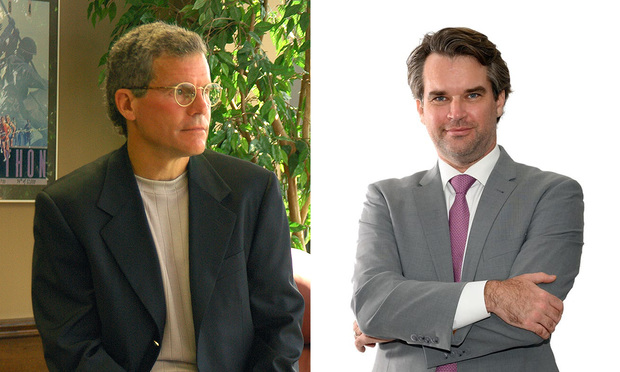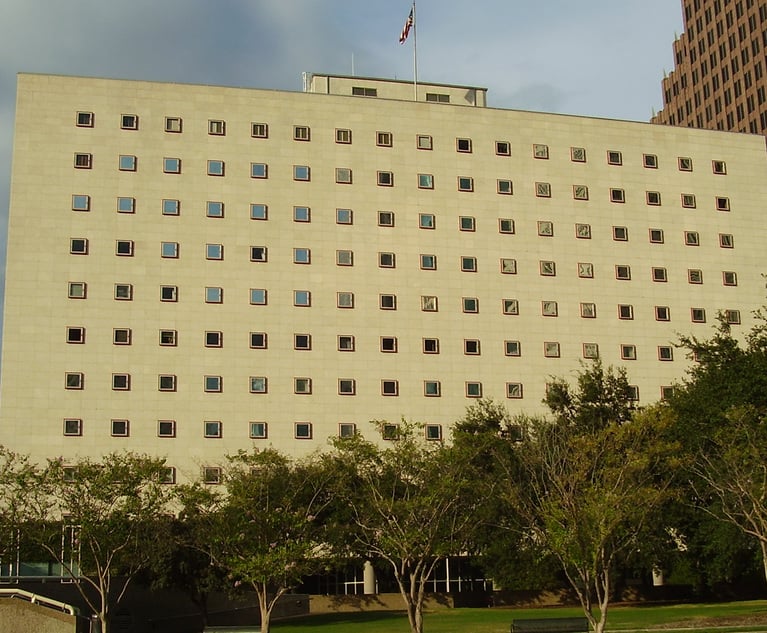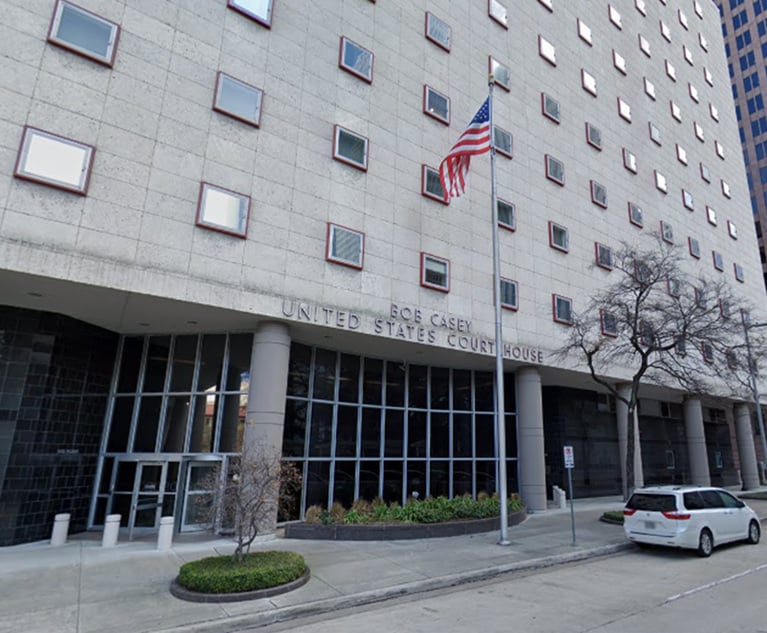Why 2 Houston Firms Won't Sue Health Care Providers Over COVID-19
Two medical malpractice firms in Houston have announced they will not sue doctors, hospitals or nursing homes over COVID-19 treatment, because, they say, there's no standard of care yet.
May 15, 2020 at 05:48 PM
5 minute read
 Jack McGehee, founding partner of McGehee, Chang, Landgraf, Feiler of Houston, and Charles Brown, managing partner of Brown, Christie & Green, Houston. (Courtesy photo)
Jack McGehee, founding partner of McGehee, Chang, Landgraf, Feiler of Houston, and Charles Brown, managing partner of Brown, Christie & Green, Houston. (Courtesy photo)
With coronavirus-related lawsuits popping up around the country, two small medical malpractice firms in Houston are taking a different stance from many of their competitors.
Brown, Christie & Green and McGehee, Chang, Landgraf, Feiler announced this week they will not sue doctors, hospitals or nursing homes over their good-faith efforts in treating patients with the coronavirus.
"Given the unprecedented circumstances surrounding COVID-19, we believe that under the circumstances, assuming good-faith efforts to treat, that we can neither prove a breach of the standard of care nor causation. We do not believe that there is a true standard of care in light of the uniqueness of the situation," said Charles Brown, managing partner of Brown Christie, which has seven lawyers.
In the joint announcement, five-lawyer McGehee Chang noted that hospitals are "doing their best to write new policies, try new protocols, and manage the pandemic," and as they develop responses, may make mistakes.
"Some mistakes will hurt people. Some mistakes will look obvious in retrospect. This problem is unprecedented until we find a solution," the firm said.
Texas Lawyer caught up with Brown, and with Jack McGehee, a founding partner in McGehee Chang, about their decision to step away from a potentially lucrative area in medical malpractice litigation.
Their answers have been edited lightly for clarity and style.
Why did both of your firms decide against bringing medical malpractice litigation against doctors, hospitals or nursing homes related to COVID-19 care?
Jack McGehee: Charles and I focus on representing brain-damaged children and we sue hospitals for horrible mistakes that cause horrible damages. I think we both would be disingenuous [if we held] hospitals to a standard of care that does not exist.
Charles Brown: I'll broaden that to also include physicians or nursing homes, even. In a world where we don't yet truly have treatments available, it is difficult to assign a standard of care.
McGehee: There are still some things that happen in the environment that do have a clear standard of care that we don't exactly talk about, [for example], failing to provide sufficient food or hydration in a nursing home, but when it comes to providing [a certain standard of care] to COVID-19 patients, there just isn't.
Medical malpractice work is what your firms do. Aren't you eliminating a potential area of work and revenue with this decision?
McGehee: Yes, we are. But I think that in my heart of hearts what we do is good for society … The next patient in line will receive better care because of our cases. With COVID-19, I think the hospitals are equally interested in protecting the next in line. Our interests are similar. So as their revenue is getting slashed and they are fighting a common enemy, I come to them not as an adversary this time. I come under the peace tent.
Brown: I agree that we are arguably giving up potential cases. But I believe that it is more important that those of us who handle medical malpractice cases acknowledge the reality of what is facing the health care community and our country at this unique time. President [George W.] Bush recently said that we are more than just partisan combatants. Similarly, even though my firm litigates against hospitals and nursing homes, at times like this we need to remember that we all have the best interests of the patients and the residents as our ultimate goal.
Were all of the partners in your firms on board with this choice?
McGehee: I have a dictatorship over here, so yes.
Brown: It was a brief discussion. There's just only so much we can do. If there's no standard of care, there's no standard of care, [so] we don't take these cases.
What litigation would you take related to the coronavirus pandemic?
McGehee: I would emasculate a meat packing plant that refused to test employees and put them in a hostile environment, but that's not a health care issue. I haven't had that call yet, but if I do, I would take that call. To summarize Charles' and my position, I think with respect to health care providers, we are spotting good-faith mistakes. We aren't using a microscope to judge their decisions today … but if you take it out of a hospital and put it in big business, then all bets are off.
Brown: Candidly, we only handle medical malpractice, so at this point in time, [even] if it is directly related to COVID-19, that wouldn't be an area we'd practice in.
Do you think other firms will take the same stance on suing health care providers over standard of care related to the coronavirus?
McGehee: When Charles, who is an opinion leader in the country, makes such a public stand on this issue, I think others will follow. I think it's a great discussion point for trial lawyers.
How are you an opinion leader, Charles?
Brown: Jack is very nice to me. It's important to get this out there.
Read More
Texas Lawsuit Against Nursing Home Over Worker's COVID-19 Death Could Point to Trend in Litigation
NOT FOR REPRINT
© 2025 ALM Global, LLC, All Rights Reserved. Request academic re-use from www.copyright.com. All other uses, submit a request to [email protected]. For more information visit Asset & Logo Licensing.
You Might Like
View All
Conspiracy Suits Against Quinn Emanuel, Roc Nation Moved to Federal District Court

JCPenney Seeks Return of More Than $1.1M From Jackson Walker For Bankruptcy Work
3 minute read
Ex-Appellate Court Judges Launch Boutique Focused on Plaintiffs Appeals
2 minute read
O'Melveny, White & Case, Skadden Beef Up in Texas With Energy, Real Estate Lateral Partner Hires
5 minute readTrending Stories
- 1Uber Files RICO Suit Against Plaintiff-Side Firms Alleging Fraudulent Injury Claims
- 2The Law Firm Disrupted: Scrutinizing the Elephant More Than the Mouse
- 3Inherent Diminished Value Damages Unavailable to 3rd-Party Claimants, Court Says
- 4Pa. Defense Firm Sued by Client Over Ex-Eagles Player's $43.5M Med Mal Win
- 5Losses Mount at Morris Manning, but Departing Ex-Chair Stays Bullish About His Old Firm's Future
Who Got The Work
J. Brugh Lower of Gibbons has entered an appearance for industrial equipment supplier Devco Corporation in a pending trademark infringement lawsuit. The suit, accusing the defendant of selling knock-off Graco products, was filed Dec. 18 in New Jersey District Court by Rivkin Radler on behalf of Graco Inc. and Graco Minnesota. The case, assigned to U.S. District Judge Zahid N. Quraishi, is 3:24-cv-11294, Graco Inc. et al v. Devco Corporation.
Who Got The Work
Rebecca Maller-Stein and Kent A. Yalowitz of Arnold & Porter Kaye Scholer have entered their appearances for Hanaco Venture Capital and its executives, Lior Prosor and David Frankel, in a pending securities lawsuit. The action, filed on Dec. 24 in New York Southern District Court by Zell, Aron & Co. on behalf of Goldeneye Advisors, accuses the defendants of negligently and fraudulently managing the plaintiff's $1 million investment. The case, assigned to U.S. District Judge Vernon S. Broderick, is 1:24-cv-09918, Goldeneye Advisors, LLC v. Hanaco Venture Capital, Ltd. et al.
Who Got The Work
Attorneys from A&O Shearman has stepped in as defense counsel for Toronto-Dominion Bank and other defendants in a pending securities class action. The suit, filed Dec. 11 in New York Southern District Court by Bleichmar Fonti & Auld, accuses the defendants of concealing the bank's 'pervasive' deficiencies in regards to its compliance with the Bank Secrecy Act and the quality of its anti-money laundering controls. The case, assigned to U.S. District Judge Arun Subramanian, is 1:24-cv-09445, Gonzalez v. The Toronto-Dominion Bank et al.
Who Got The Work
Crown Castle International, a Pennsylvania company providing shared communications infrastructure, has turned to Luke D. Wolf of Gordon Rees Scully Mansukhani to fend off a pending breach-of-contract lawsuit. The court action, filed Nov. 25 in Michigan Eastern District Court by Hooper Hathaway PC on behalf of The Town Residences LLC, accuses Crown Castle of failing to transfer approximately $30,000 in utility payments from T-Mobile in breach of a roof-top lease and assignment agreement. The case, assigned to U.S. District Judge Susan K. Declercq, is 2:24-cv-13131, The Town Residences LLC v. T-Mobile US, Inc. et al.
Who Got The Work
Wilfred P. Coronato and Daniel M. Schwartz of McCarter & English have stepped in as defense counsel to Electrolux Home Products Inc. in a pending product liability lawsuit. The court action, filed Nov. 26 in New York Eastern District Court by Poulos Lopiccolo PC and Nagel Rice LLP on behalf of David Stern, alleges that the defendant's refrigerators’ drawers and shelving repeatedly break and fall apart within months after purchase. The case, assigned to U.S. District Judge Joan M. Azrack, is 2:24-cv-08204, Stern v. Electrolux Home Products, Inc.
Featured Firms
Law Offices of Gary Martin Hays & Associates, P.C.
(470) 294-1674
Law Offices of Mark E. Salomone
(857) 444-6468
Smith & Hassler
(713) 739-1250






